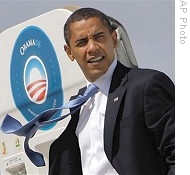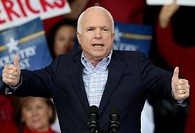-
(单词翻译:双击或拖选)
 |
| Barack Obama exits campaign plane in Tampa, Florida, 20 Oct 2008 |
Barack Obama became the first major party candidate not to join the public financing system for the general election campaign, backing away from an earlier pledge that he would do so. This frees the Democratic candidate to raise an unlimited2 amount from private donations.
Republican candidate John McCain chose to take public funds, and is now limited to spending the $84 million he received from the public financing system during the final two months of the campaign.
The Obama campaign has raised an unprecedented3 total of more than $600 million during the campaign, almost equaling the combined amount both major candidates, George Bush and John Kerry, raised in the 2004 presidential election.
Speaking on Fox News Sunday, Senator McCain said this kind of runaway4 campaign spending is cause for concern.
 |
| Sen. John McCain gestures at a rally in Woodbridge, Virginia.,18 Oct. 2008 |
"But what I worry about is future elections too. Not only mine, I worry most about mine at the moment, but what is going to happen the next time around?" McCain noted5. "Four years from now, what is going to happen? Particularly if you have got an incumbent6 president and we no longer stick to the public financing, which was a result of the Watergate scandal."
McCain also criticized Obama for not living up to his pledge to accept public funds.
The Obama campaign argues that it has developed what amounts to a parallel financing system of its own, with more than three-million individual donors7 contributing to his campaign, many of them donating small sums over the Internet. The campaign says the average donation for September was less than $100.
Obama's financial advantage is making it possible for him to drown McCain's message in a flood of TV, web and radio ads. Obama is even advertising8 in video games.
Evan Tracey is president of the Campaign Media Analysis Group, a private firm that provides political advertising information to its clients. Tracey said he has never seen anything like Obama's success and corresponding dominance of the airwaves.
"For the casual viewer, for the person who is just kind of tuning9 into this race knowing that they are going to be voting in a couple of weeks, all they are seeing in a lot of these battleground states are Obama ads on TV, all they are hearing are Obama ads on radio," Tracey noted. "It just really gives Obama the advantage of somewhat blanketing the paid media, the advertising aspect of this race, and it just makes it that much harder for Senator McCain to have a message that is able to cut through."
One of John McCain's television ads questions "Who is Barack Obama?", and uses it to counter some of Obama's ads against him.
A recent Obama TV ad says McCain is attacking him to distract voters' attention away from the economic crisis.
The candidates also use their campaign money to open offices in hotly contested states and to conduct grassroots voter registration10 and voter turnout efforts with paid field workers. Obama has also purchased 30 minutes of prime time on network television to address American voters in the week before the election.
 收听单词发音
收听单词发音
1
nominee

|
|
| n.被提名者;被任命者;被推荐者 | |
参考例句: |
|
|
|
2
unlimited

|
|
| adj.无限的,不受控制的,无条件的 | |
参考例句: |
|
|
|
3
unprecedented

|
|
| adj.无前例的,新奇的 | |
参考例句: |
|
|
|
4
runaway

|
|
| n.逃走的人,逃亡,亡命者;adj.逃亡的,逃走的 | |
参考例句: |
|
|
|
5
noted

|
|
| adj.著名的,知名的 | |
参考例句: |
|
|
|
6
incumbent

|
|
| adj.成为责任的,有义务的;现任的,在职的 | |
参考例句: |
|
|
|
7
donors

|
|
| n.捐赠者( donor的名词复数 );献血者;捐血者;器官捐献者 | |
参考例句: |
|
|
|
8
advertising

|
|
| n.广告业;广告活动 a.广告的;广告业务的 | |
参考例句: |
|
|
|
9
tuning

|
|
| n.调谐,调整,调音v.调音( tune的现在分词 );调整;(给收音机、电视等)调谐;使协调 | |
参考例句: |
|
|
|
10
registration

|
|
| n.登记,注册,挂号 | |
参考例句: |
|
|
|















